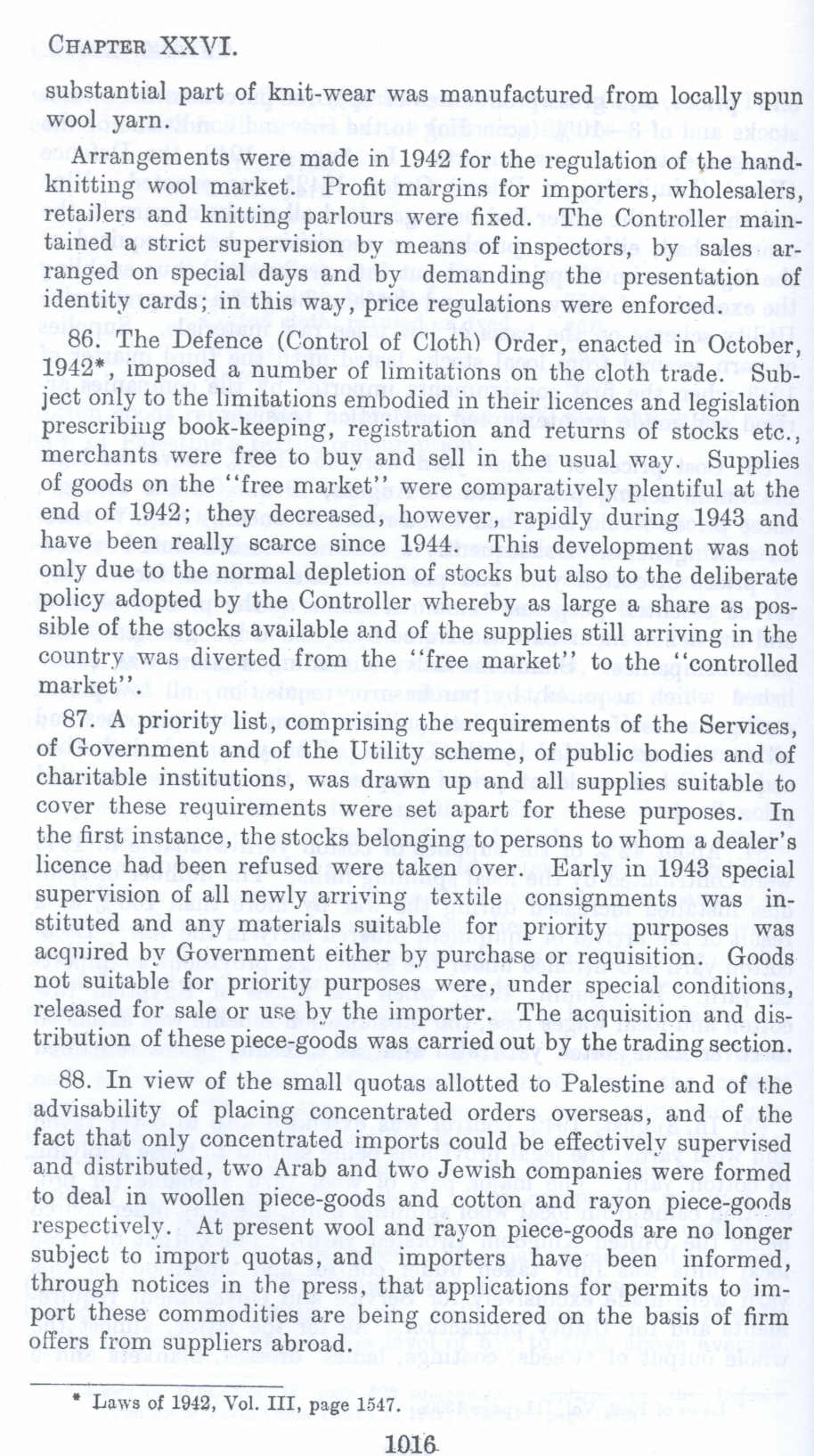| Prev | Next |  |
| Prev | Next |
| PalestineRemembered | About Us | Oral History | العربية | |
| Pictures | Zionist FAQs | Haavara | Maps | |
| Search |
| Camps |
| Districts |
| Acre |
| Baysan |
| Beersheba |
| Bethlehem |
| Gaza |
| Haifa |
| Hebron |
| Jaffa |
| Jericho |
| Jerusalem |
| Jinin |
| Nablus |
| Nazareth |
| Ramallah |
| al-Ramla |
| Safad |
| Tiberias |
| Tulkarm |
| Donate |
| Contact |
| Profile |
| Videos |
British Mandate: A Survey of Palestine: Volume II - Page 1016 |
Disclaimer
The above documents, article, interviews, movies, podcasts, or stories reflects solely the research and opinions of its authors. PalestineRemembered.com makes its best effort to validate its contents.


Post Your Comment
*It should be NOTED that your email address won't be shared, and all communications between members will be routed via the website's mail server.
substantial part of knit-wear was manufactured from locally spun wool yarn.
Arrangements were made in 1942 for the regulation of the handknitting' wool market. Profit margins for importers, wholesalers, retailers and knitting parlours were fixed. The Controller maintained a strict supervision by means of inspectors, by sales arranged on special days and by demanding the presentation of identity cards; in this way, price regulations were enforced.
86. The Defence (Control of Cloth) Order, enacted in October, 1942*, imposed a number of limitations on the cloth trade. Subject only to the limitations embodied in their licences and legislation prescribing book-keeping, registration and returns of stocks etc., merchants were free to buy and sell in the usual way. Supplies of goods on the "free market" were comparatively plentiful at the end of 1942; they decreased, however, rapidly during 1943 and have been really scarce since 1944. This development was not only due to the normal depletion of stocks but also to the deliberate policy adopted by the Controller whereby as large a share as possible of the stocks available and of the supplies still arriving in the country was diverted from the "free market" to the "controlled market".
87. A priority list, comprising the requirements of the Services, of Government and of the Utility scheme, of public bodies and of charitable institutions, was drawn up and all supplies suitable to cover these requirements were set apart for these purposes. In the first instance, the stocks belonging to persons to whom a dealer's licence bad been refused were taken over. Early in 1943 special supervision of all newly arriving textile consignments was instituted and any materials suitable for priority purposes was acquired by Government either by purchase or requisition. Goods not suitable for priority purposes were, under special conditions, released for sale or use by the importer. The acquisition and distribution of these piece-goods was carried out by the trading section.
88. In view of the small quotas allotted to Palestine and of the advisability of placing concentrated orders overseas, and of the fact that only concentrated imports could be effectively supervised and distributed, two Arab and two Jewish companies were formed to deal in woollen piece-goods and cotton and rayon piece-goods respectively. At present wool and rayon piece-goods are no longer subject to import quotas, and importers have been informed, through notices in the press, that applications for permits to import these commodities are being considered on the basis of firm offers from suppliers abroad.
_______________________________________
* Laws of 1942, Vol. Ill, page 1547.
1016